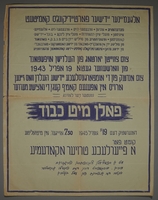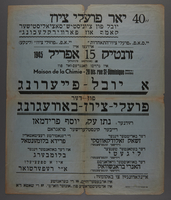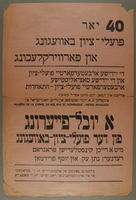Overview
- Brief Narrative
- Flier advertising a gathering organized by the United Jewish Socialist Party owned by Moszek (born Moishe) Brycman. The gathering was in support of Eretz-Israel, and held at the Maison de la Chimie in Paris, France. The participants ((Zalman Roubachov, Zarbavel, Idelson, Arnstein, and Georges Nadjib Nazor) belonged to a delegation from Israel to the International Congress of Labor Unions. In 1931, Moishe immigrated to Paris, France, and the following year he married Marie Edelszein. Moishe was involved in Zionist youth movements and belonged to Poale Zion. In June 1940, following the German invasion of France, Moishe fled and made his way to Pau, France, where he became active in the Zionist resistance. Working under the codename “Bremond,” he helped manufacture false papers, bring children and adults to safety in Spain, and establish contact with other resistance groups in the Pyrenees. In April 1943, the resistance asked him to move to Grenoble, France. From May 1943 to September 1944, he stayed in Grenoble where he served as treasurer of the Committee for the Defense of the Jews and helped bring children safely over the border into Switzerland. Moishe was liberated by American forces in Grenoble in August 1944. After liberation he returned to Paris and worked with Jewish children in a home in Les Andelys, France.
- Date
-
use:
1945 September 30
- Geography
-
use:
Paris (France)
- Credit Line
- United States Holocaust Memorial Museum Collection, Gift of Moszek Brycman
- Markings
- front, printed, black ink : [Hebrew characters]
front, top, printed, black ink : MAISON DE LA CHIMIE, 28bis rue St-Dominique - Métro Invalides Solférino
front, bottom, printed, black ink : 10bis, Rue d’Elzevir 15, Rue Béranger 9, Guy Patin / 83, Avenue de la Grande Armée Rue Ferdinand Duval - Contributor
-
Subject:
Moszek Brycman
- Biography
-
Moishe (now Moszek, b. 1909) Szulim Brycman was the son of Rabbi Abraham Leib and Hanna Feigele Schneiderman Brycman. Moishe was born in Kirov, Poland, near Lublin. His father taught Yiddish and Talmud, and his mother sold groceries and kitchen utensils. Moishe had two sisters, Minda and Malka, and two brothers, Haim (now Edelhertz) and Simcha. In 1923, Moishe moved to Warsaw, Poland, where he was active in Zionist youth movements and was an acquaintance of Emanuel Ringelblum. In 1931 he immigrated to Paris, France, and the following year he married Marie Edelszein. Moishe continued his involvement in Zionist youth movements and belonged to Poale Zion.
In June 1940, following the German invasion of France, Moishe fled to Poitiers, France, by foot from Paris traveling from Orleans to Bayonne and passing through Bordeaux. In Pau, France, he became active in the Zionist resistance. Working under the codename “Bremond,” he helped manufacture false papers, bring children and adults to safety in Spain, and establish contact with other resistance groups in the Pyrenees. Though Moishe had working papers and was relatively safe in Pau, in April 1943 the resistance asked him to move to Grenoble, France. From May 1, 1943, to September 1944, he stayed in Grenoble where he served as treasurer of the Committee for the Defense of the Jews and helped bring children safely over the border into Switzerland. He also published an underground newspaper and fliers appealing to Frenchmen to resist deportation orders.
Moishe was liberated by American forces in Grenoble in August 1944 at the age of 35. After liberation he returned to Paris and worked with Jewish children in a home in Les Andelys, France. Though both Moishe and his wife, Marie, survived the Holocaust, both of his parents as well as three of his siblings perished. Only his brother, Haim, survived.
Physical Details
- Language
- Yiddish
- Classification
-
Posters
- Category
-
Fliers
- Object Type
-
Handbills (tgm)
- Genre/Form
- Posters.
- Physical Description
- Yiddish-language flier printed in black ink on off-white paper. The text is printed in Hebrew characters, centered on the page, and in several different size fonts. Some information, including years, numerals, and address information is recorded in Latin script. The paper is slightly discolored.
- Dimensions
- overall: Height: 8.310 inches (21.107 cm) | Width: 5.310 inches (13.487 cm)
- Materials
- overall : paper, ink
Rights & Restrictions
- Conditions on Access
- No restrictions on access
- Conditions on Use
- No restrictions on use
Keywords & Subjects
- Topical Term
- Socialism--France--History--20th century. Socialists -- Associations, institutions, etc.
- Geographic Name
- Paris (France).
Administrative Notes
- Legal Status
- Permanent Collection
- Provenance
- The flier was donated to the United States Holocaust Memorial Museum in 2002 by Moszek Brycman.
- Record last modified:
- 2024-04-29 07:55:03
- This page:
- https://collections.ushmm.org/search/catalog/irn520228
Download & Licensing
In-Person Research
- By Appointment
- Request 21 Days in Advance of Visit
- Plan a Research Visit
- Request to See This Object
Contact Us
Also in Moszek Brycman collection
The collection consists of posters and a flier advertising Zionist and Socialist events in post-war France, a commemoration for the Warsaw ghetto uprising, and the experiences of Moszek Brycman in France before, during, and after the Holocaust.
Date: 1945-1985

Second anniversary Warsaw Ghetto uprising poster owned by Moszek Brycman
Object
Poster announcing a memorial service for the second anniversary of the Warsaw Ghetto uprising owned by Moszek (born Moishe) Brycman. This tribute was organized by the General Jewish Defense Committee (Comité général de defense). In 1931, Moishe immigrated to Paris, France, and the following year he married Marie Edelszein. Moishe was involved in Zionist youth movements and belonged to Poale Zion. In June 1940, following the German invasion of France, Moishe fled and made his way to Pau, France, where he became active in the Zionist resistance. Working under the codename “Bremond,” he helped manufacture false papers, bring children and adults to safety in Spain, and establish contact with other resistance groups in the Pyrenees. In April 1943, the resistance asked him to move to Grenoble, France. From May 1943 to September 1944, he stayed in Grenoble where he served as treasurer of the Committee for the Defense of the Jews and helped bring children safely over the border into Switzerland. Moishe was liberated by American forces in Grenoble in August 1944. After liberation he returned to Paris and worked with Jewish children in a home in Les Andelys, France.

40th anniversary of Po'alei Zion poster owned by Moszek Brycman
Object
Blue poster advertising a celebration for the 40th anniversary of Po'alei Zion at the Maison de la Chimie owned by Moszek (born Moishe) Brycman. In 1931, Moishe immigrated to Paris, France, and the following year he married Marie Edelszein. Moishe was involved in Zionist youth movements and belonged to Poale Zion. In June 1940, following the German invasion of France, Moishe fled and made his way to Pau, France, where he became active in the Zionist resistance. Working under the codename “Bremond,” he helped manufacture false papers, bring children and adults to safety in Spain, and establish contact with other resistance groups in the Pyrenees. In April 1943, the resistance asked him to move to Grenoble, France. From May 1943 to September 1944, he stayed in Grenoble where he served as treasurer of the Committee for the Defense of the Jews and helped bring children safely over the border into Switzerland. Moishe was liberated by American forces in Grenoble in August 1944. After liberation he returned to Paris and worked with Jewish children in a home in Les Andelys, France.

40th anniversary of Po'alei Zion poster owned by Moszek Brycman
Object
Pink poster advertising a celebration for the 40th anniversary of Po'alei Zion at the Maison de la Chimie owned by Moszek (born Moishe) Brycman. In 1931, Moishe immigrated to Paris, France, and the following year he married Marie Edelszein. Moishe was involved in Zionist youth movements and belonged to Poale Zion. In June 1940, following the German invasion of France, Moishe fled and made his way to Pau, France, where he became active in the Zionist resistance. Working under the codename “Bremond,” he helped manufacture false papers, bring children and adults to safety in Spain, and establish contact with other resistance groups in the Pyrenees. In April 1943, the resistance asked him to move to Grenoble, France. From May 1943 to September 1944, he stayed in Grenoble where he served as treasurer of the Committee for the Defense of the Jews and helped bring children safely over the border into Switzerland. Moishe was liberated by American forces in Grenoble in August 1944. After liberation he returned to Paris and worked with Jewish children in a home in Les Andelys, France.



